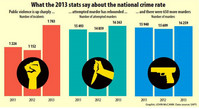
Poor detective work and weak police intelligence are behind worrying crime trends.
National police commissioner Riah Phiyega was at pains to paint an inspiring picture at the release of the annual crime statistics on Thursday in Pretoria. “This is a story of success,” she beamed at the audience.
But there was no getting away from the most disturbing facts: there was a rise in murder and attempted murder, the latter for the first time in a decade.
“It is worrying, because our murder rate is already four and a half times higher than the international average,” said the Institute of Security Studies’ Gareth Newham. “Now there are two more people being murdered on average every day than the previous year.” In total, 16 259 South Africans were murdered in the financial year 2012 to 2013.
Several categories of robbery, hijacking and burglary also had a spike in reported cases after a downward trend for many years. These are the categories that drive up murder, Newham said.
Ironically, there was a decrease in categories of crime that police can’t do much to prevent, such as sexual offences and assault, because they are dependant on social factors.
The sort of crime that takes good policing, however, is on the rise after a steady downward trend over the past nine years. Another concern is the clear sign that organised crime is growing. Car and truck hijacking, as well as business burglaries and robberies, serve as red flags for this type of crime. Those categories all spiked, with 3.6% more car hijackings in the past financial year and nearly 15% more truck hijackings.
Phiyega and Police Minister Nathi Mthethwa tried to put the figures in context by showing the success achieved over the past 10 years. But those gains were thanks to historical factors no longer in play. During previous commissioner Jackie Selebi’s tenure, crime was wrestled down from alarming levels that peaked in about 2002. About 70 000 additional officers were hired over 10 years, helping the numbers to drop the most between 2003 and 2006.
After Selebi, Bheki Cele’s bolshie approach was controversial, but went some way towards raising police officers’ morale. “And, of course, he was lucky enough to be police commissioner during the Confederation Cup and World Cup, which resulted in dramatically more resources being thrown at the police,” said Newham.
It’s good, old-fashioned detective work that is missing and, critically, healthy crime intelligence to arrest the growth of organised crime, according to Newham.
But South Africa is a long way from that, with suspended crime intelligence boss Richard Mdluli’s trials leaving the sector weak.
“The crime intelligence division needs a permanent head, a person of impeccable integrity so that that person can give a sense of direction back to a unit that has been severely compromised,” said Newham.
By: Verashni Pillay
Verashni Pillay graduated from Rhodes University
Article Source: Mail & Guardian
